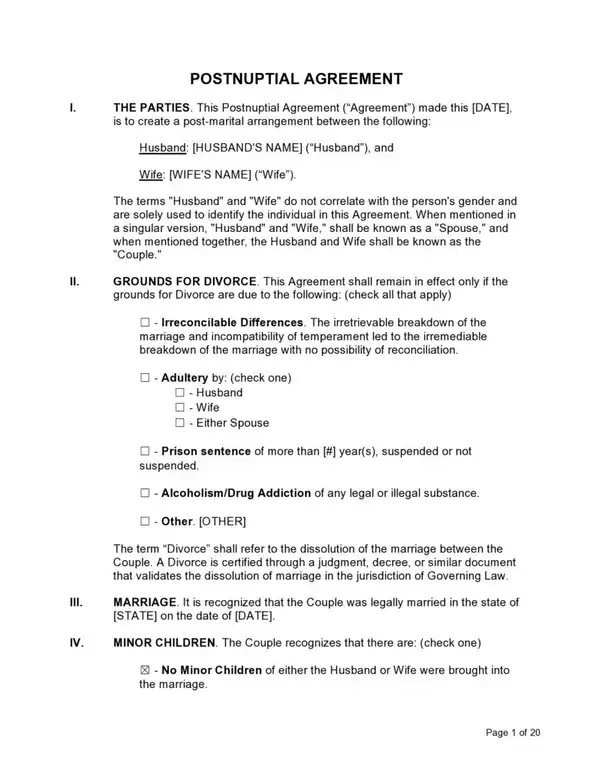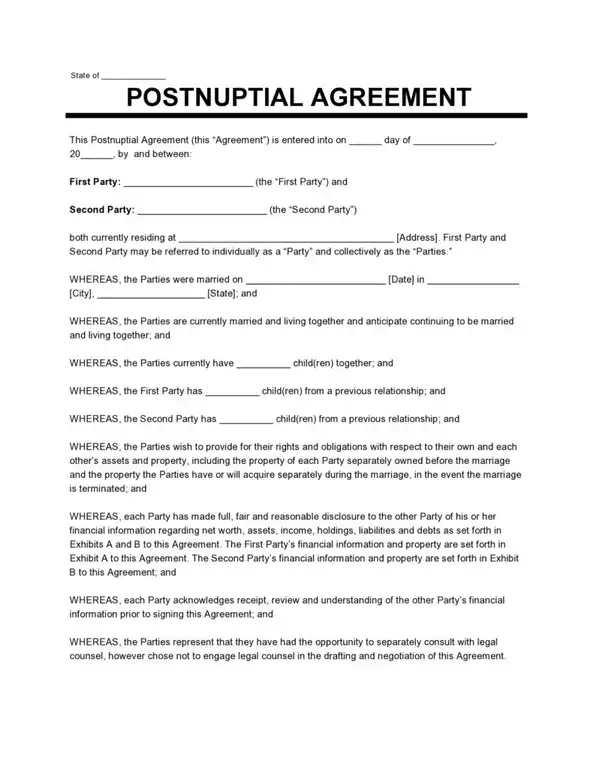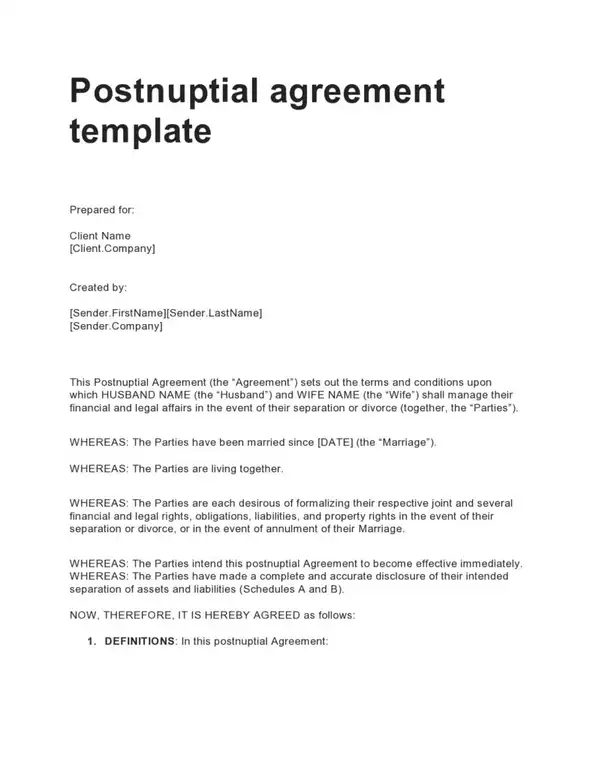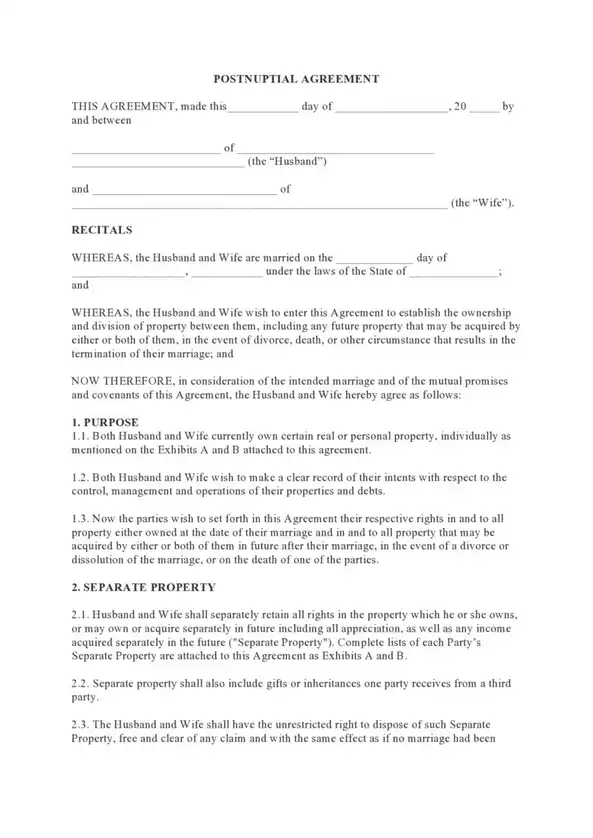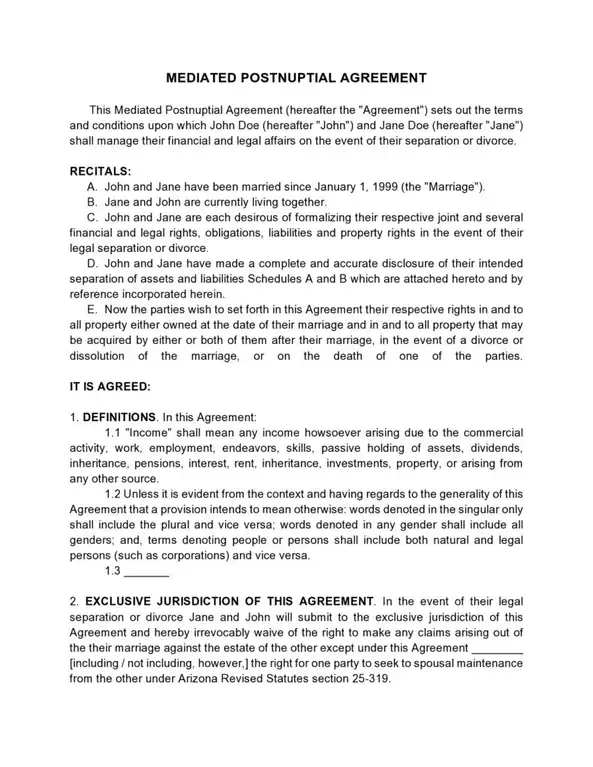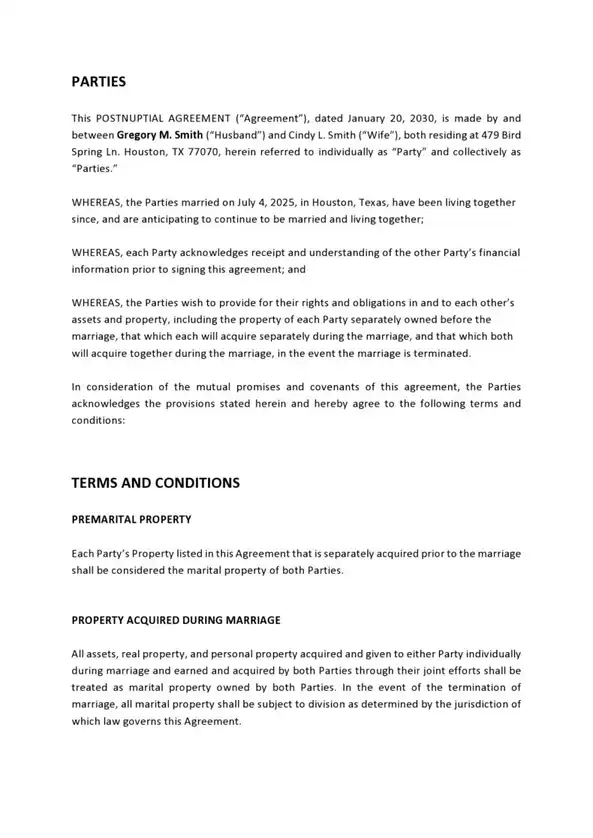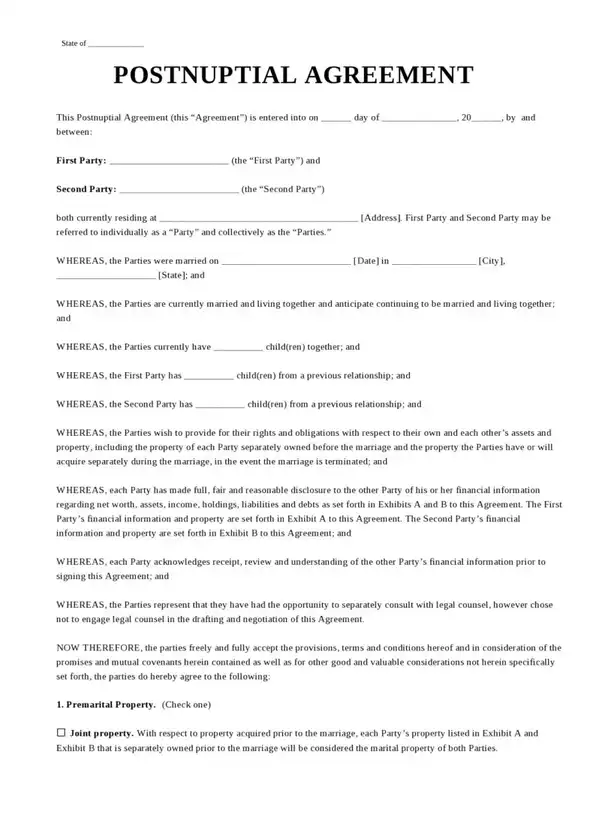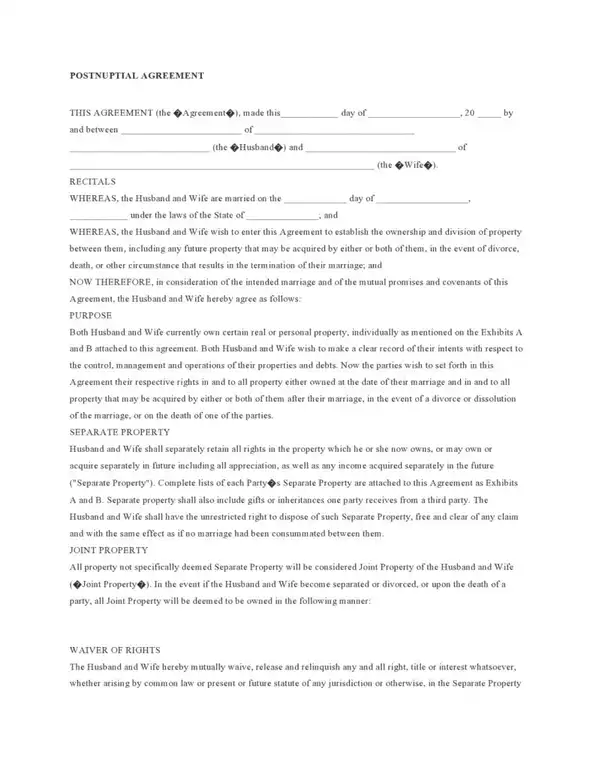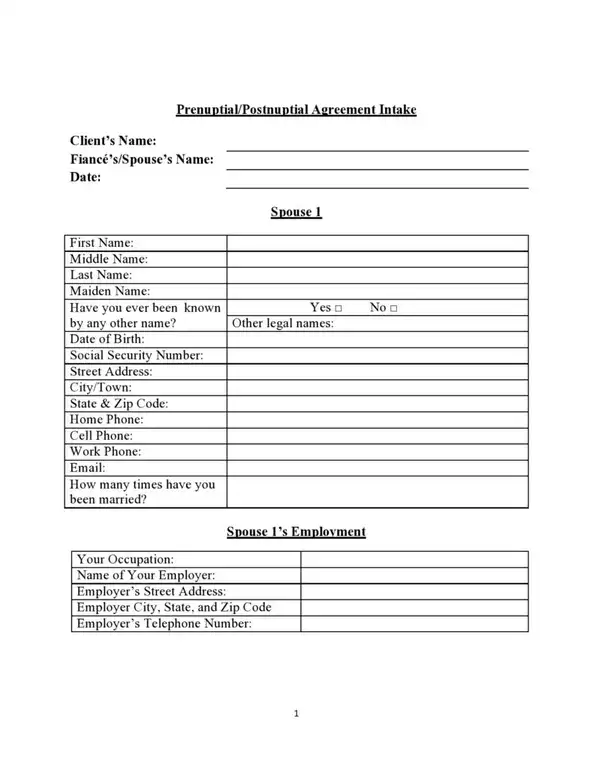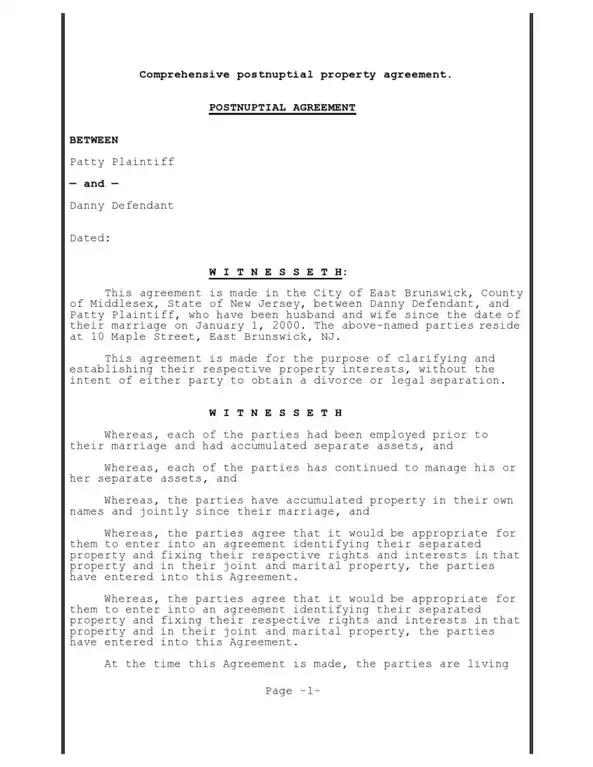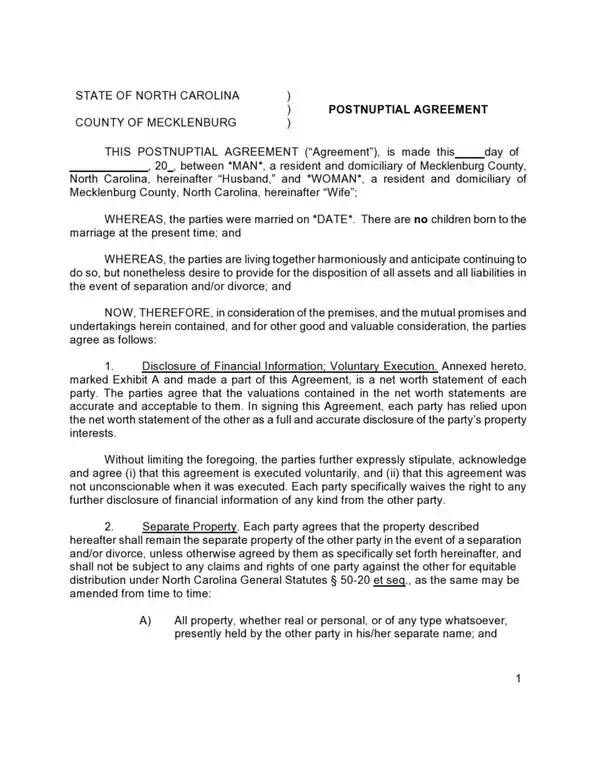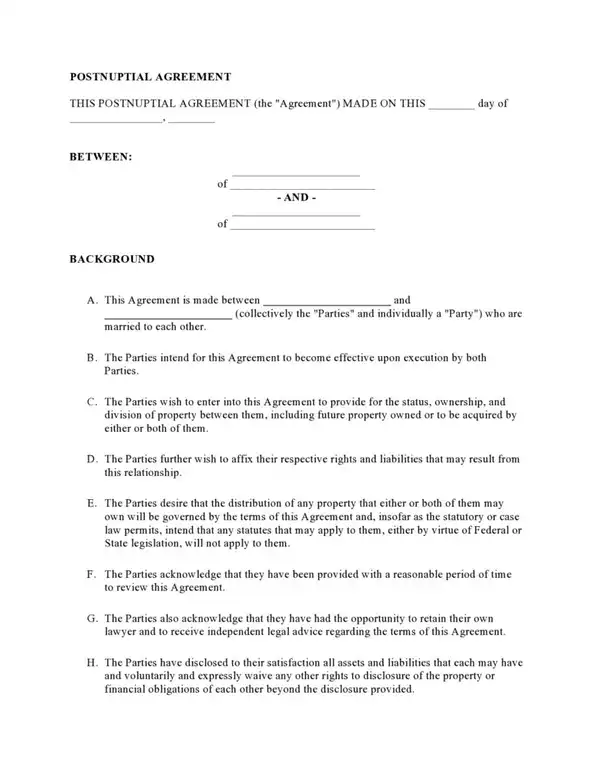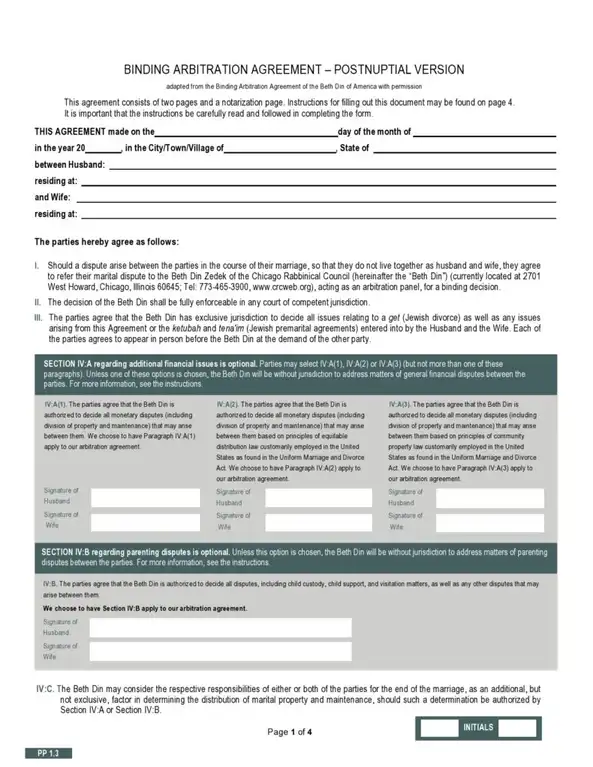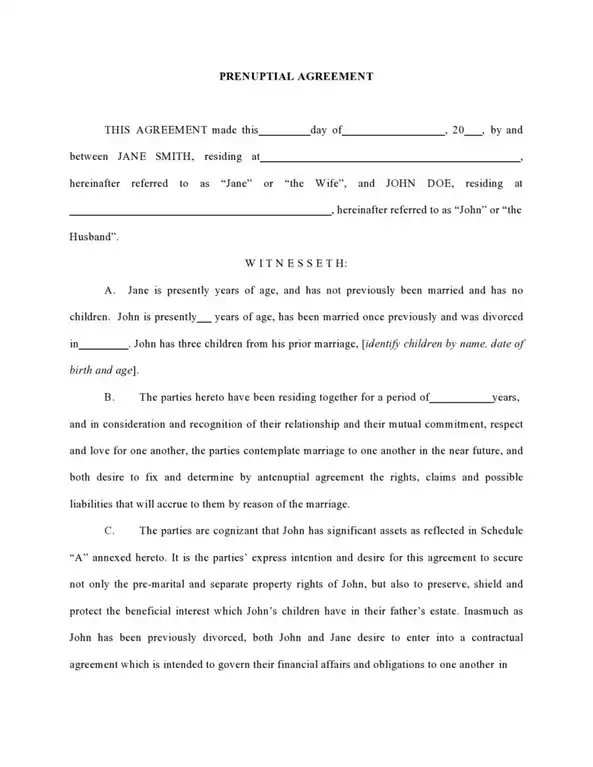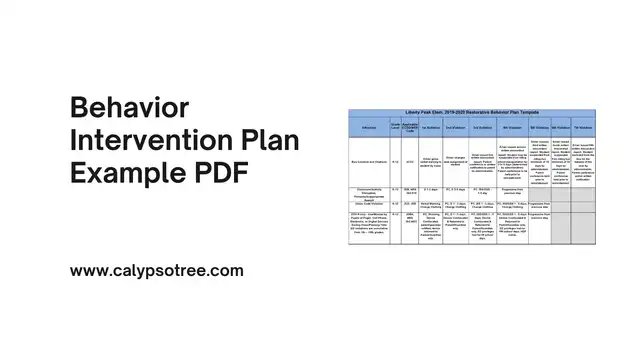A postnuptial agreement is a legal paper that married couples create. It explains how they will split their things, handle money, and other important matters if they get divorced or separated. Unlike a prenuptial agreement made before marriage, a postnuptial agreement is made after marriage. This guide will explain a postnuptial agreement, its benefits, legal aspects, common clauses, and more.
What is a postnuptial Agreement?
A postnuptial agreement is like a prenuptial agreement but is made after the couple is married. It helps protect both spouses by clearly stating how they will divide their money property, and handle other important issues. The main goal of a postnuptial agreement is to provide financial security and clarity if the marriage ends.
Why Do Couples Opt for a postnuptial Agreement?
Couples choose to create it for several important reasons:
Financial Security:
It can clearly state how money and property will be split if the marriage terminates. It helps both spouses understand what to anticipate, reducing worries about the future.
Asset Protection:
Some people enter a marriage with valuable items or property they want to protect. These could be anything from a family heirloom to a house or business. These can ensure that these assets stay with the original owner.
Debt Responsibilities:
Marriages often involve shared financial responsibilities. If one spouse has a lot of debt, the other might worry about being responsible for it.
Business Interests:
If one or both partners own a company, they should save it. These can outline how the company will be handled and split if the marriage ends.
Peace of Mind:
Knowing a plan in place can provide peace of mind for both spouses.
Changes in Circumstances:
Life changes can prompt the need for a postnuptial agreement. This might include receiving a large inheritance, starting a new business, or experiencing significant changes in income. Updating their agreement allows the couple to adjust to these new circumstances.
Children from Previous Marriages:
Couples with children from previous marriages might want to ensure their kids are protected.
Strengthening the Marriage:
Sometimes, creating a postnuptial can strengthen a marriage. The process requires honest communication about finances and plans, which can improve trust and understanding between spouses.
Postnuptial Agreement Template
Here is an example of a postnuptial agreement template:
What Can Be Included in a Postnuptial Agreement?
It can manage a variety of issues. Here are some key ones:
- Property Division: This outlines how assets and properties will be divided in the event of a divorce.
- Spousal Support: This sets the terms for any spousal support or alimony that may be required.
- Debt Responsibilities: This specifies who will be responsible for debts incurred during the marriage.
- Custody Arrangements: If the couple has children, this section can include plans for custody and visitation.
- Other Clauses: Any additional terms the couple agrees upon, such as inheritance rights or retirement benefits.
What Cannot Be Included in a Postnuptial Agreement?
There are some issues they need to address. Here are some key points:
Child Custody and Support
It cannot decide child custody or child support. Courts always determine what is best for the children, considering many factors to ensure their well-being.
Illegal Terms
It cannot include anything illegal, such as terms that violate public policy or laws. Any such terms will make the agreement invalid.
Personal Matters
It usually does not cover personal matters, such as how chores are divided or how often relatives visit. These personal matters are not enforceable by law.
Future Changes
It cannot predict every future event and can’t cover things that may change, like future income or new debts. Couples need to update their agreements if significant changes happen.
Waiving Rights
Certain rights cannot be waived in a postnuptial agreement. For example, one spouse cannot wholly relinquish their right to alimony if the law requires it.
Temporary Agreements
Temporary agreements or arrangements are usually excluded. Postnuptial agreements are meant to be long-term solutions, not short-term fixes.
What Does a postnuptial Agreement Look Like?
A postnuptial agreement is a clear and organized document. It usually includes the following sections:
Introduction
- The names of the spouses.
- The date of the marriage.
- The date the agreement is made.
Definitions
- Explains important terms used in the agreement.
Purpose
- States why the agreement is being made.
Disclosure of Assets and Debts
- Lists all the money, property, and debts each spouse has.
Division of Property
- Details how property and money will be divided if the couple separates or divorces.
Spousal Support
- States if one spouse will pay support to the other and how much.
Debt Responsibilities
- Explains who will pay which debts.
Children
- If there are children, this section can include plans for their care.
Signatures
- Both spouses sign and date the agreement.
- It often includes a notary’s signature to make it official.
Legal Aspects of Postnuptial Agreements
It must adhere to specific rules. Key points include:
- Voluntary Agreement: Both spouses must willingly agree to the terms without pressure or coercion. They should feel comfortable and unrushed when signing.
- Full Disclosure: Both spouses must fully disclose their financial information, including all assets, debts, income, and expenses. Concealing information can invalidate the agreement.
- Fair and Reasonable: The agreement must be equitable and not heavily favor one spouse. Courts will review the terms to ensure they are just and reasonable.
- Written and Signed: The agreement must be documented in writing and signed by both spouses to be legally binding. Verbal agreements or unsigned documents are not enforceable in court.
- Legal Review: It is advisable to have a lawyer review the agreement to ensure it complies with state laws and protects both parties’ rights.
Couples can create a robust and fair postnuptial agreement by following these guidelines.
How to Write a Postnuptial Agreement
Writing a postnuptial agreement involves several steps. Here’s a simple guide:
- Talk with Your Spouse
- Discuss why you want the agreement and what you both want to include.
- List Your Assets and Debts
- Write down everything you own and owe. Be honest and thorough.
- Decide on the Terms
- Agree on how you will divide property and handle finances.
- Decide if spousal support will be paid and how much.
- If you have children, discuss their care.
- Write the Agreement
- Start with the introduction, including your name and the date.
- Clearly define important terms.
- State the purpose of the agreement.
- List all assets and debts.
- Detail how property and money will be divided.
- Include terms for spousal support and debt responsibilities.
- Add any plans for children if needed.
- End with a section for signatures.
- Get Legal Help
- Have a lawyer review your agreement. They can make sure it’s fair and follows the law.
- Sign the Agreement
- Both spouses sign and date the agreement.
- Consider having it notarized to make it official.
Postnuptial Agreement Example
Here is a simple example of postnuptial agreement :
Common Mistakes and How to Avoid Them
There are common mistakes people make. Here’s how to avoid them:
- Not Being Honest Mistake: Sometimes, one spouse might hide money or debts. This lack of honesty can cause big problems later. How to Avoid: Be open and honest about your finances. List all your money, property, and debts. This helps ensure that the agreement is fair and legal.
- Rushing the Process Mistake: Some couples must consider it before creating the agreement. This can lead to mistakes or unfair terms. How to Avoid: Take your time to discuss and understand each part of the agreement. Make sure you both feel comfortable with the terms before signing.
- Not Getting Legal Help Mistake: Couples might try to write the agreement themselves without a lawyer. This can result in legal errors or an invalid agreement. How to Avoid: Hire a lawyer to help draft and review the agreement. A legal expert can ensure the document meets all legal requirements and protects both of you.
- Making It One-Sided Mistake: It may be considered unfair if the agreement heavily favors one spouse. Courts can only accept balanced agreements. How to Avoid: Ensure the agreement is fair to both parties. Discuss each term and make compromises so that both of you feel the terms are just.
- Not Updating the Agreement Mistake: Life changes, but sometimes couples must remember to update their agreement. This can make the agreement outdated and less useful. How to Avoid: Review and update your agreement regularly, especially after big life events like a new job, the birth of a child, or buying a house.
- Ignoring State Laws Mistake: Different states have different laws about postnuptial agreements. Ignoring these laws can make the agreement invalid. How to Avoid: Make sure your agreement follows the laws of your state. Your lawyer can help ensure it complies with local regulations.
This way, you can create a strong and fair agreement that protects both of you.
Cost of Creating a Postnuptial Agreement
Creating a postnuptial agreement costs money, but it can save trouble later. Here’s what to expect:
- Attorney Fees Cost: You must hire a lawyer to help write the agreement. Lawyers charge for their time and advice. How to Save: Talk to a few lawyers to determine their prices. Choose one that fits your budget and has good reviews.
- Complexity of the Agreement Cost: If your agreement has many details, it might cost more. Simple agreements are cheaper than complex ones. How to Save: Only include what is necessary. Keep the agreement clear and simple.
- Negotiation Time Cost: It will cost more if you and your spouse need much time to agree on terms. More meetings with the lawyer mean higher fees. How to Save: Try to agree on the main points before meeting with the lawyer. This will save time and money.
- Review Fees Cost: After writing the agreement, you might want another lawyer to review it. This ensures everything is fair and legal. How to Save: Ask for a flat fee for the review. This can be cheaper than paying by the hour.
The cost of creating a postnuptial agreement varies but can save money and stress later.
Who Should Consider Getting It?
A postnuptial agreement isn’t just for wealthy couples. Here’s who might need one:
- Married Couples Why: Any married couple can benefit. It helps set clear rules for finances and property.
- People with Valuable Assets Why: A postnuptial agreement can protect valuable assets such as a house, business, or other property.
- Couples with Children from Previous Marriages Why: If you have kids from a previous marriage, you should ensure they get certain assets. The agreement can specify what goes to whom.
- Couples Who Have Experienced Big Changes Why: If you received an inheritance, started a new job, or bought a house, updating your agreement is smart. It makes sure the new assets are protected.
- Couples Wanting Peace of Mind Why: Knowing there is a plan can reduce stress. It provides clear rules and helps avoid conflicts.
Many people, not just the wealthy, can benefit from a postnuptial agreement. It helps protect assets, set clear rules, and provide peace of mind.
Postnuptial Agreement Sample PDF
Below is the postnuptial agreement sample pdf:
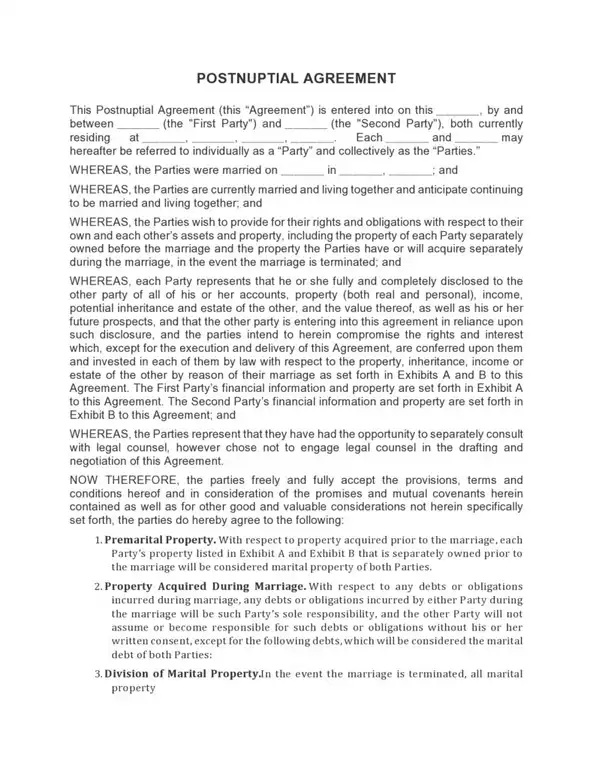
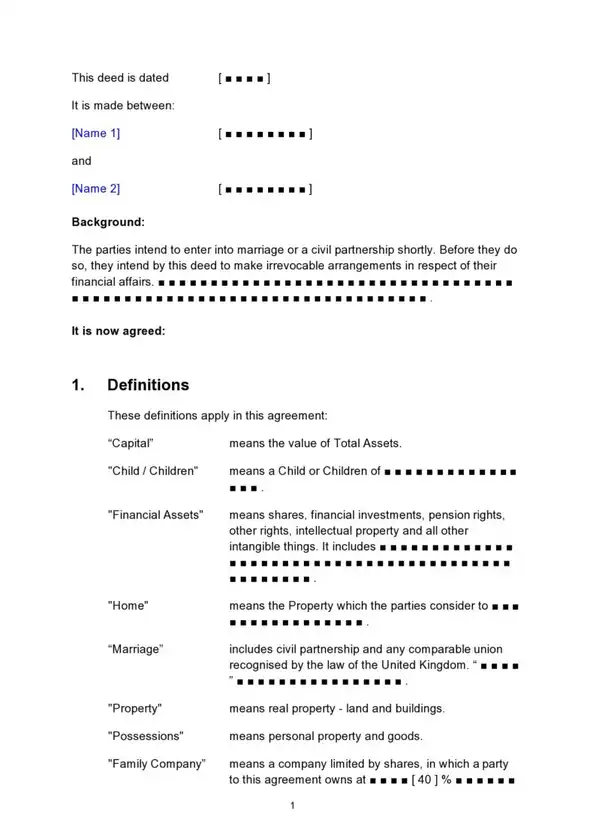
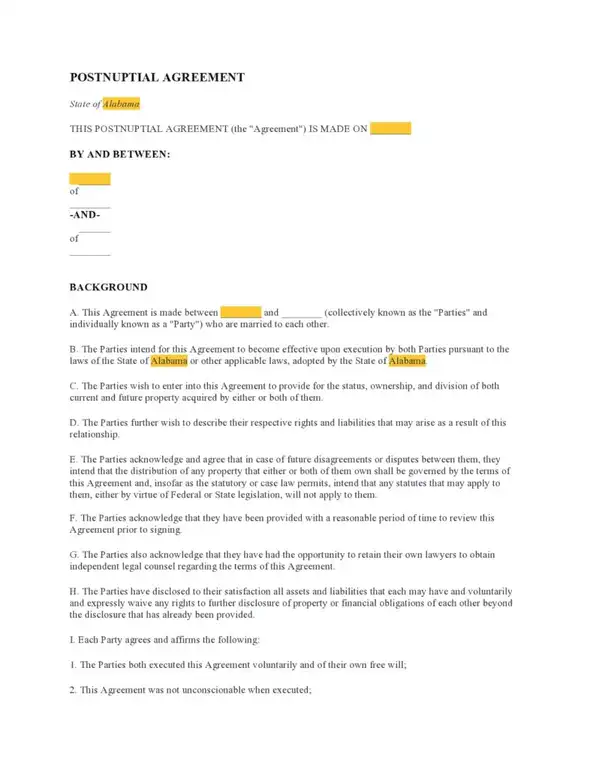
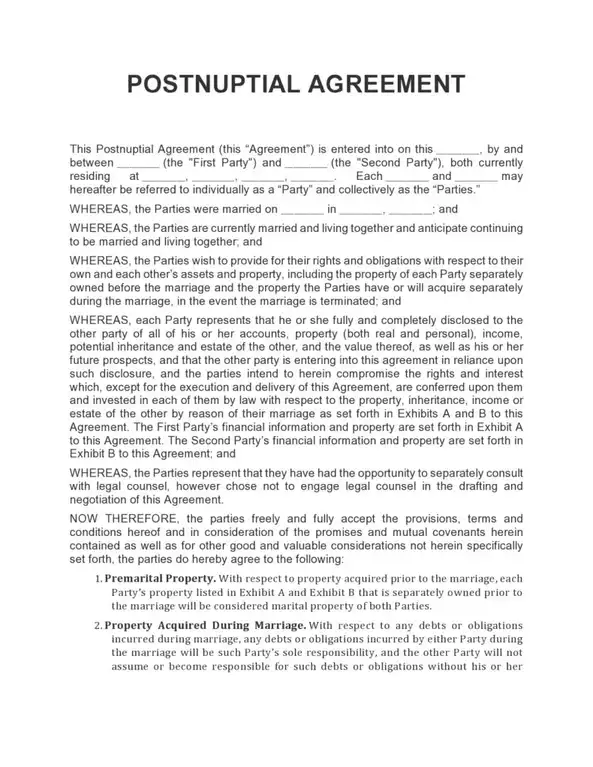
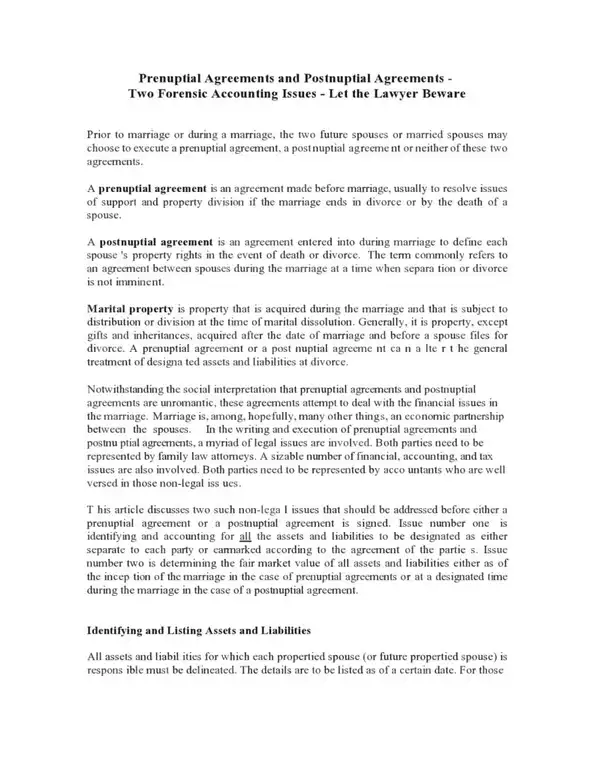
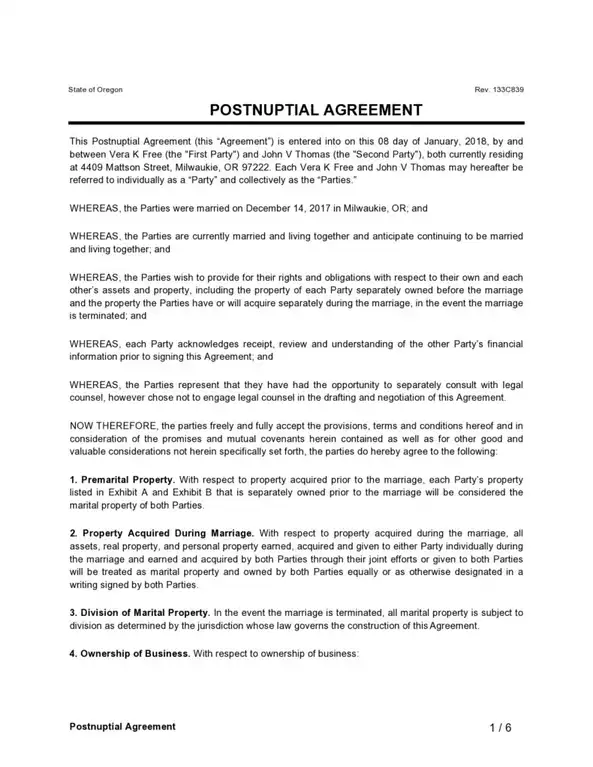
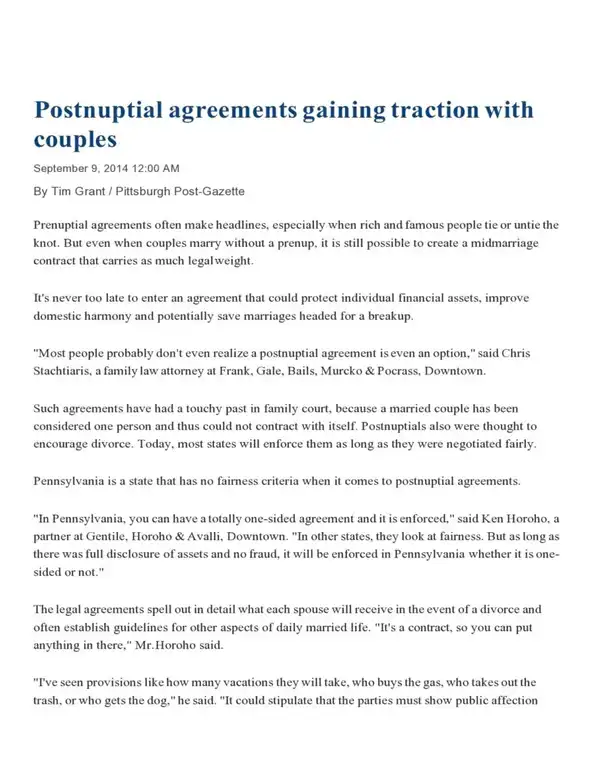
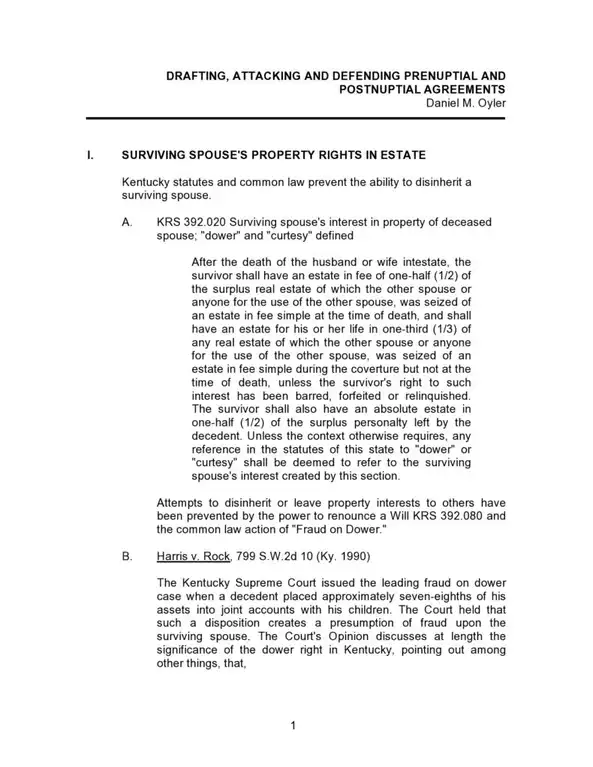
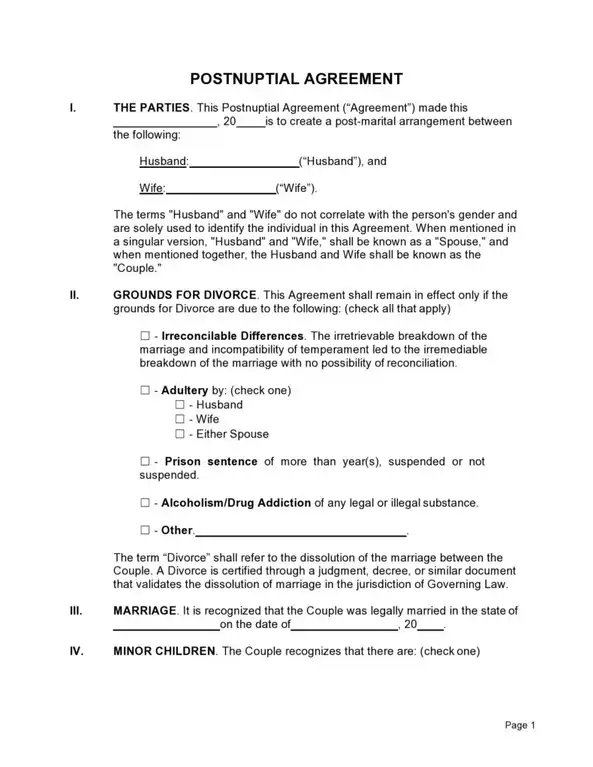
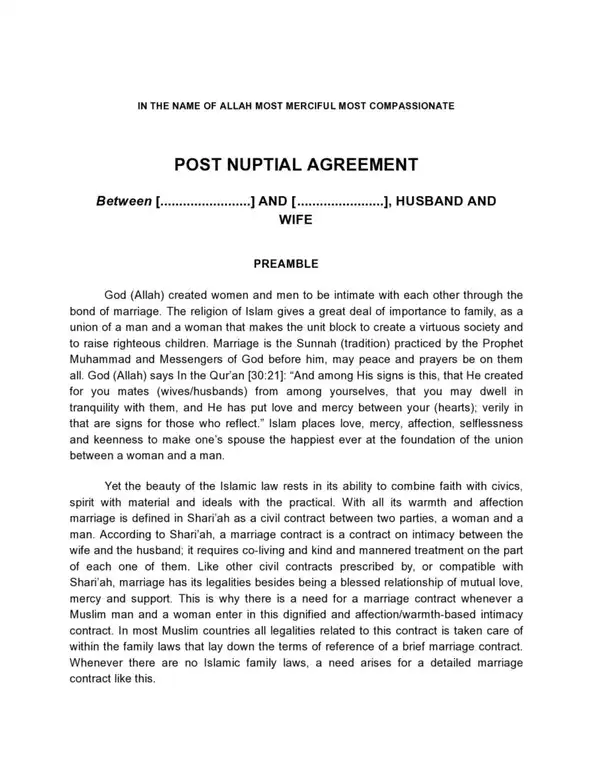
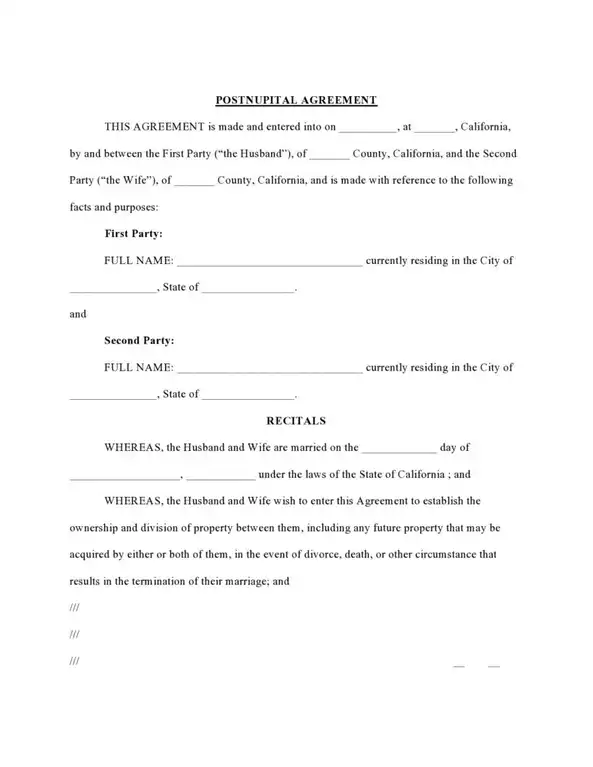
FAQs
Can I write my postnuptial agreement?
Yes, you can write it. However, ensuring that it is fair and follows the law is important. Having a lawyer review it to ensure it is legally binding is a good idea.
Are postnuptial agreements a good idea?
Yes, it can be a good idea for many couples. They help clarify how money and property will be divided if the marriage ends. This can reduce stress and avoid conflicts.
Is a postnuptial agreement legally binding?
It can be legally binding if it meets specific requirements. Both spouses must sign it willingly, and there must be full disclosure of assets and debts. It should also be fair to both parties.
Is a postnuptial agreement legal in India?
Yes, it is legal in India. However, they must meet certain conditions to be valid. It is best to consult a lawyer in India to ensure the agreement follows local laws.
A postnuptial agreement is a helpful tool for married couples. It protects their financial interests and clarifies their responsibilities if they get divorced or separated. By knowing the legal aspects, benefits, and common mistakes, couples can make a fair and strong agreement. This agreement gives peace of mind and financial security. Always talk to a lawyer when making a postnuptial agreement to ensure it meets all legal rules and is fair for both spouses.

The content creator team at calipsotree.com is dedicated to making topics accessible to everyone, with over 9 years of experience in writing and breaking down complex concepts into easy-to-understand articles that answer readers’ financial questions.






